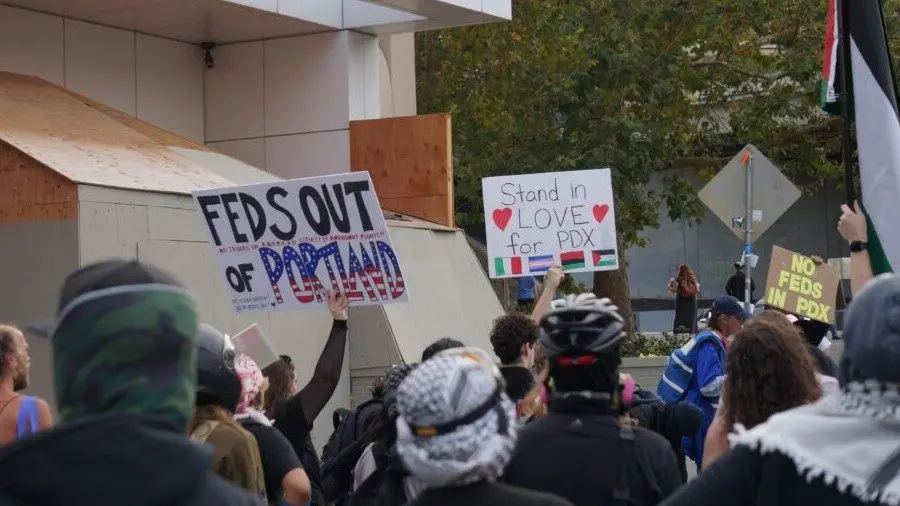PORTLAND, OR – A federal judge extended for two more weeks orders barring President Donald Trump and his administration from deploying National Guard troops to Portland, but an imminent decision from a higher court could upend them.
Judge Karin Immergut, a Trump appointee, in a telephonic hearing on Wednesday extended two temporary restraining orders she first issued on Oct. 4 and Oct. 5 that barred Trump first from federalizing and deploying Oregon National Guard to Portland, then from deploying any National Guard troops from any state and the District of Columbia to Portland.
An expedited, three-day trial over the case is scheduled for Oct. 29, despite federal lawyers trying to get the trial moved to “at least” Nov. 20. The state of Oregon and the city of Portland contend Trump violated several laws and the 10th Amendment of the U.S. Constitution by attempting to deploy Guard troops to Portland over the objections of state and local elected leaders. Each of these issues deals with the balance of state and federal power — particularly related to authority over policing within states — and the extent of presidential power over the U.S. military.
The federal government submitted no new evidence to Immergut to paint a sense of urgency that Guard were needed at the South Portland Immigrations and Customs Enforcement facility, where generally small and peaceful protests have taken place in recent months. Trump has argued that protesters are impeding federal immigration officials from carrying out their orders, and that the city is a “hellscape” and a “war zone.”
But another decision expected this week from three judges on the 9th Circuit Court of Appeals in San Francisco could end up nullifying Immergut’s orders, and the state’s case, altogether.
Appellate Judges Susan Graber, Ryan Nelson and Bridget Bade — the first a former Oregon Supreme Court Justice and Clinton appointee, and the latter two appointed by Trump — will decide whether Immergut’s first order, which barred Trump from federalizing the Oregon National Guard, can stand.
More than that, they’ll decide whether the president has the authority to federalize the Oregon National Guard. Trump and Defense Secretary Pete Hegseth have so far federalized and deployed 200 Oregon Guard troops and up to 300 California Guard troops to state-run military camps in Warrenton and Happy Valley, respectively. Hegseth on Oct. 5 also ordered the federalization of 400 Texas Guard to go to Portland, Chicago and “other locations” though it’s unclear if any were actually sent to Oregon.
Those federalized guard members are taking orders from the U.S. Northern Command, a joint federal military command based in Colorado, while they wait to learn whether they will be deployed or sent home.
Two of the three appellate judges signaled in a hearing last Thursday that they were deferential to giving the president the power to continue to federalize those troops, and the court on Friday agreed to maintain Trump’s hold over 200 Oregon National Guard but not to allow him to deploy them until they reach a decision.
Michael Gerardi, a lawyer for the U.S. Justice Department, said at the Wednesday hearing that if the 9th Circuit judges overrule Immergut’s first temporary restraining order barring the Oregon Guard Deployment, that the government’s lawyers will, within 48 hours, ask Immergut to dissolve both restraining orders and the state’s lawsuit against the federal government.
Brian Marshall, senior assistant attorney general at the Oregon Department of Justice, said the state would require at least 48 hours to respond to that request before Immergut made a decision.
That it’s taken the 9th Circuit judges nearly a week to release a decision is curious to legal scholars.
When three different 9th Circuit judges issued a decision in a similar situation in June that blocked a lower court judge’s temporary restraining order against Trump’s Guard federalization and deployment in Los Angeles, the judges issued their decision 48 hours after the oral arguments.
Willamette University professor Norman Williams, a constitutional law expert, said he suspects the three judges reviewing Oregon’s temporary restraining order will issue a 2-1 decision in favor of the federal government.
“I think that the passage of time means there’s a dissent being written,” Williams said, and that it’s likely being written by Graber.
This story first appeared on Oregon Capital Chronicle.





